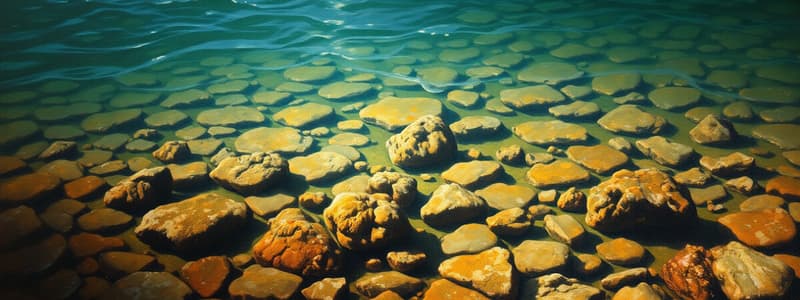Podcast
Questions and Answers
What is the process called when sediments are compacted and cemented together?
What is the process called when sediments are compacted and cemented together?
- Erosion
- Metamorphosis
- Lithification (correct)
- Diagenesis
Which of the following best describes chemical sedimentary rocks?
Which of the following best describes chemical sedimentary rocks?
- Rocks primarily formed from eroded sediments
- Rocks created through high temperature and pressure
- Rocks formed by direct precipitation of minerals (correct)
- Rocks formed from volcanic activity
What initiates a new cycle of rock formation in the rock cycle?
What initiates a new cycle of rock formation in the rock cycle?
- The erosion of metamorphic rocks
- The cooling of sedimentary rocks
- The deposition of sediments in bodies of water
- The melting of rocks into magma and lava (correct)
What does the term 'meta-' in metamorphic rock imply?
What does the term 'meta-' in metamorphic rock imply?
What is the primary focus of the theory of plate tectonics?
What is the primary focus of the theory of plate tectonics?
What was Georges Cuvier's stance on how landforms and rocks were formed?
What was Georges Cuvier's stance on how landforms and rocks were formed?
What major concept did Charles Lyell promote in his writings?
What major concept did Charles Lyell promote in his writings?
How did the scientific community's view of uniformitarianism change with the influence of Lyell?
How did the scientific community's view of uniformitarianism change with the influence of Lyell?
What did Georges Cuvier contribute to the field of paleontology?
What did Georges Cuvier contribute to the field of paleontology?
What was a significant impact of Hutton's ideas on the scientific community at the time?
What was a significant impact of Hutton's ideas on the scientific community at the time?
What distinguishes a quantitative observation from a qualitative observation in scientific study?
What distinguishes a quantitative observation from a qualitative observation in scientific study?
Which of the following best exemplifies a pseudoscience?
Which of the following best exemplifies a pseudoscience?
How does uniformitarianism differ from catastrophism in geology?
How does uniformitarianism differ from catastrophism in geology?
What aspect of scientific study does the use of objective evidence aim to mitigate?
What aspect of scientific study does the use of objective evidence aim to mitigate?
Which of the following steps is crucial in conducting a reputable scientific study?
Which of the following steps is crucial in conducting a reputable scientific study?
Flashcards are hidden until you start studying
Study Notes
Lithification and Sedimentary Rocks
- Sediments accumulate often in shallow marine environments, with older layers buried by new deposits.
- Compaction occurs from the weight of overlying sediments, while individual grains are cemented by minerals from groundwater.
- The processes of compaction and cementation are termed lithification, resulting in sedimentary rocks like sandstone and shale.
- Chemical sedimentary rocks form through direct mineral precipitation rather than from eroded sediments.
Metamorphic Rocks
- Metamorphic rocks form from pre-existing rocks subjected to high temperature or pressure, altering mineral crystals.
- Such conditions typically occur deep within the Earth or near hot magma or lava.
- If temperatures and pressures are extreme enough to melt rocks into magma and lava, the rock cycle can restart.
Plate Tectonics
- Plate tectonics is the fundamental principle of geology, explaining the movement of Earth’s layers, particularly the lithospheric plates.
- This theory unifies concepts related to the rock cycle and geological processes.
Scientific Method in Geology
- Geologists apply the scientific method to study Earth’s materials and processes.
- The field is essential for resource location, extraction, environmental impact assessment, and natural hazard understanding.
- Geology integrates principles of physics and chemistry to explain natural phenomena, such as landslides and chemical weathering.
Importance of Studying Geology
- Geology informs the extraction and use of natural resources, crucial for societal development.
- Geologists assist in accessing fossil fuels, metals, and water resources, balancing the conservation of nonrenewable resources.
- Resource extraction affects the environment and human health, necessitating careful management.
History of Geological Thought
- Abraham Gottlob Werner and Georges Cuvier were early proponents of catastrophism, asserting that past geological formations resulted from catastrophic events.
- Charles Lyell’s works, especially "Principles of Geology," promoted uniformitarianism and introduced the concept of Earth's age exceeding 300 million years.
- Lyell's influence helped transition geological thought from catastrophism to a gradual, uniformitarian view of Earth's processes.
Geological Time Scale
- Life emerged over 3.8 billion years ago; the vast majority of Earth's history consisted of single-celled organisms until complex multicellular life proliferated during the Phanerozoic Eon.
- The Phanerozoic Eon marks the appearance of multicellular animals with hard parts, whose remains become fossils in the geological record.
Studying That Suits You
Use AI to generate personalized quizzes and flashcards to suit your learning preferences.




